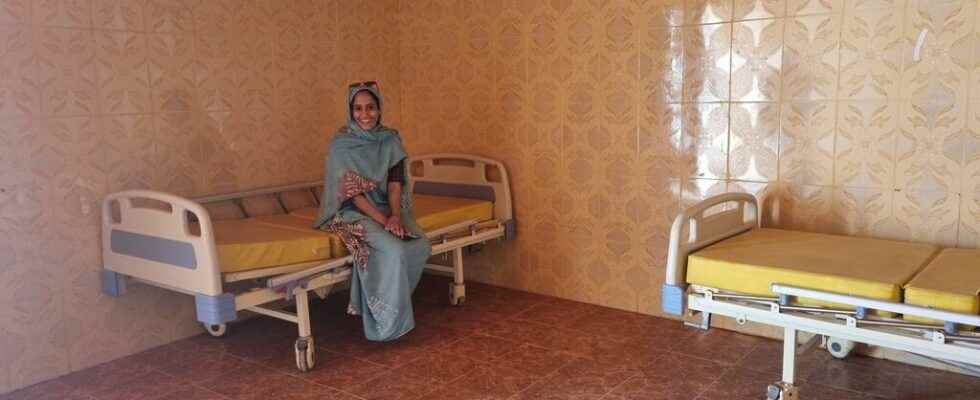Teslem Sidi is a Saharawi activist. From Madrid, she fights not only for the cause of her people, in conflict with Morocco for over 40 years, but also for the identity and freedom of Sahrawi women.
She struggles to contain her emotions. On the tarmac at Tindouf airport, her eyes shine like the moon above her. She watches him: My mother always told me that wherever I am, we will always have the Moon in common she smiles. It has been ten years since Teslem Sidi has not seen his mother. Ten years since she trod barefoot the desert that saw her grow up. ” I keep talking about the Sahara but after ten years, I need to see what is really going on there. Otherwise, I’ll just be another Westerner talking about something that isn’t even really hers anymore. “, explains the young woman of 27 years.
Teslem Sidi, called Tesh, was born in 1994 in the Sahrawi refugee camps of Tindouf in southwestern Algeria. It is there, in “the Hamada”, the desert in the desert, that the Sahrawi exiles have been living since 1976. They would be nearly 200,000 today. Tesh’s mother and paternal grandmother are among the first women to have taken the path of exodus when the conflict began between the Polisario Front (Sahrawi separatists editor’s note), Morocco and Mauritania. A war that will last until 1991date of the ceasefire (broken in November 2020 editor’s note) and the promise, never kept, of the United Nations (UN) to organize a referendum on self-determination.
The fight for nationality
As a child, Teslem was entrusted to her grandmother exiled in Mauritania: “ I grew up raising goats… a real little nomad jokes the one who is now a computer engineer in a large Spanish bank. ” When I was brought back to the Tindouf camps, I was seven years old. Until then, I knew that I had a family but my mother, my brothers… only had a theoretical existence for me. I didn’t know what they looked like “, she recalls. At the age of eight, she participated in the “vacaciones en paz” program which, since the 1980s, has allowed Sahrawi refugees aged 7 to 12 to be welcomed during the summer by families in Spain. The objective: to keep the children away from the extreme temperatures of the desert, to allow them to live in contact with Western families and at the same time to sensitize the latter to the Sahrawi cause: ” We were the best ambassadors of the cause “says Teslem. ” We also had a very important responsibility for our age. I remember that during the summer, I asked for chocolate, money, nougats to bring back to those who had stayed in the camps “.
The years pass and this responsibility towards those who remain in Tindouf increases. Teslem continues his studies in Spain: “ I needed a stable, well-paid job to be able to support my family in the camps. “, she explains. For several years Teslem – whose father is considered Spanish because he was born in the time of the Spanish Sahara – will remain in Spain illegally because the administration will not recognize either his parentage or his birth certificate, issued by the Sahrawi Arab Democratic Republic (the SADR). ” It was the tragedy of my life. I couldn’t travel, I couldn’t go on school trips, I was terrified when I saw the police “, she says in the Spanish podcast muevete a tu bola. She will finally obtain Spanish nationality by proving fifteen years of legal residence in the country and will make this legal battle one of her fights.
Advancing the freedom and rights of Sahrawi women
Today Teslem is known to the Spanish media, in particular thanks to its activity on social networks, its explanatory videos and its role as president of the Sahrawi association of the community of Madrid. It organizes demonstrations and speeches to raise awareness of the Saharawi cause, the situation of refugees and to constantly remind Spain of its responsibility as the administrative power of Western Sahara. But it wasn’t always easy: I started as an activist only two years ago. Before, I didn’t want to know anything. I needed to forge my own identity as a refugee, as a woman and as a Sahrawi “, she explains.
Because Teslem is part of this new generation of women who have a double fight: to be the voice of those who are not heard in the camps and, at the same time, to advance the freedom and rights of Sahrawi women. “ My own fight is that of identity “, she chants. Moreover, on the Spanish networks and media she appears without Melhfa (traditional dress of Sahrawi women), at the risk of being criticized by her own community. Followed by a few thousand people, she wants to be a reference for young refugee girls in Tindouf. To show them that they can see beyond the camps and that the struggle for freedom also involves self-affirmation: ” I claim that to be Sahrawi, one does not need to wear the Melhfa, nor the veil. Women must be able to lead the political struggle, no matter what they wear “, she says.
Teslem brushes aside all her doubts with the wave of her hand, she hides her sensitivity behind her eloquence, her self-mockery and her smile. She is a woman of decision: I’ll probably never see the outcome of the cause “, she says pragmatically, “ But I would also have contributed “. His goal for the future: the political struggle in western countries. ” It is by entering politics that we will be able, as Sahrawis of the diaspora, to make things happen…“, she says determined.
